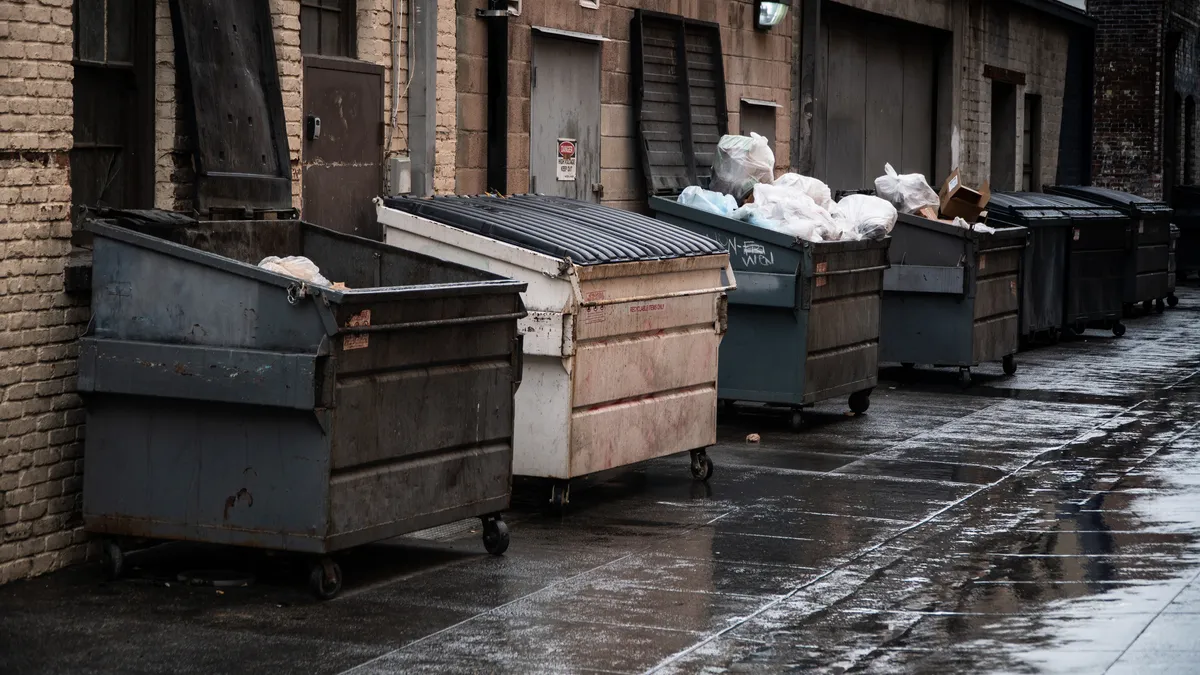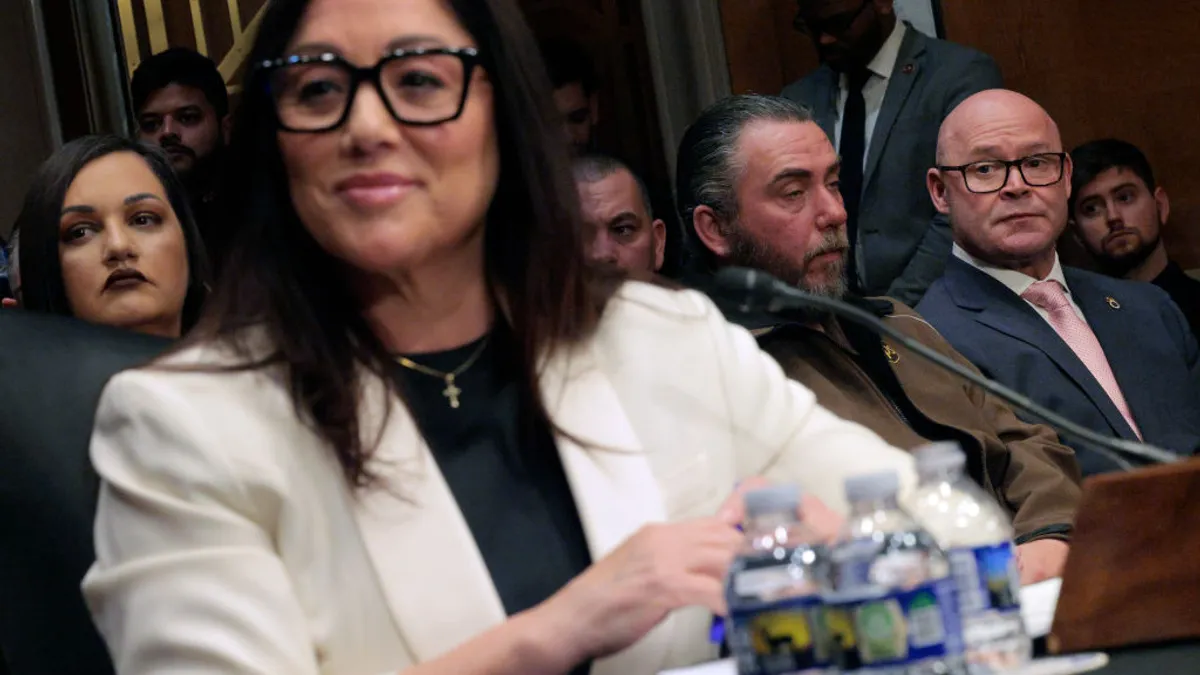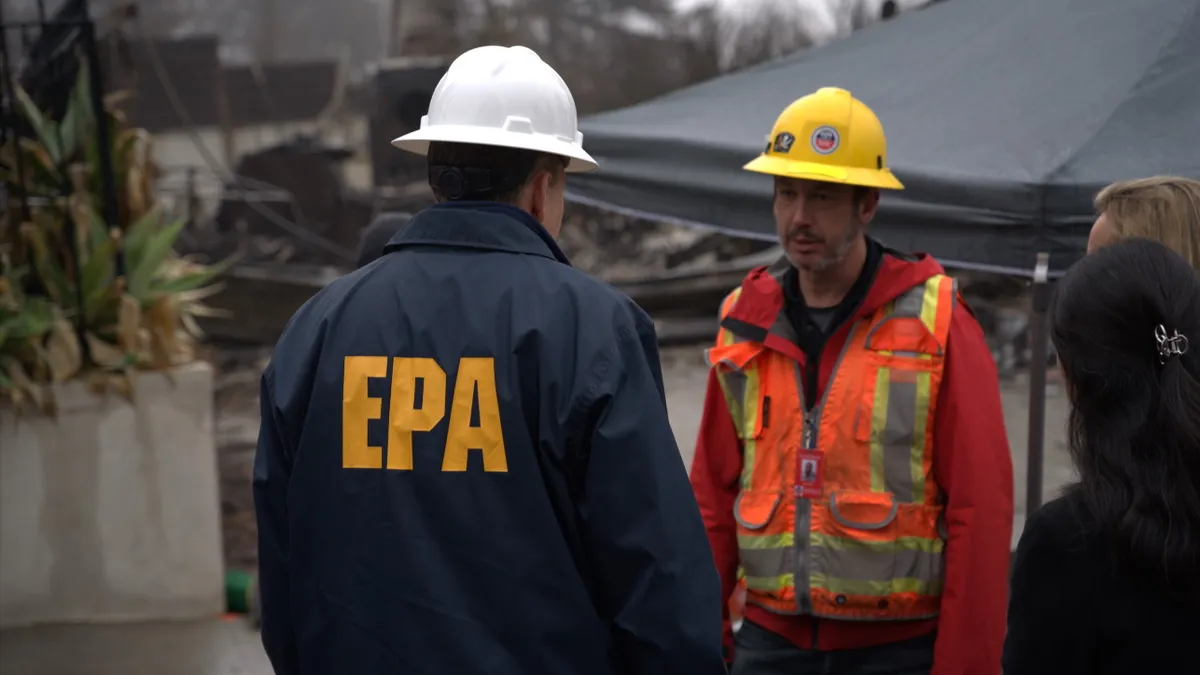Editor’s Note: Waste and recycling is an inherently local issue, and we’re looking for new ways to highlight how these stories fit into broader trends. Send us tips or feedback at waste.dive.editors@industrydive.com.
Deprivatization debate
Privatization of local waste and recycling services has become increasingly common in recent decades. This month, two municipalities with populations of a little over 20,000 each took key steps toward bucking the trend.
Almost 15 years into a 20-year arrangement with Waste Connections, the city of Port Angeles, Washington, moved to cancel its contract at a March 16 council meeting. As soon as this fall, the city plans to take over operations of its transfer station, residential recycling collection routes, and other services – as well as negotiate new post-collection arrangements for processing and disposal.
This will mean filling 12 new full-time equivalent positions and possibly spending as much as $2.5 million on new equipment in the first year. Beyond these upfront costs, elected officials and staff described it as a way to ensure long-term rate stability for residents.
“I think it’s becoming more and more difficult for third parties to compete when their labor costs are typically the same as ours and we don’t have a markup,” said Thomas Hunter, director of public works and utilities, adding the city can take this on because it already has administrative infrastructure as a full-service utility provider.
Relations with the company have been fraught, with Waste Connections suing Port Angeles for $4.8 million over disputes about rate increases and other issues last year. Hunter said that litigation is in mediation and is separate from this decision. Waste Connections did not respond to a request for comment.
This week, Simpsonville, South Carolina, also took an initial step toward bringing waste collection service back under the city’s purview despite receiving offers to continue outsourcing. A current five-year contract with ACE Environmental was arranged in part to help handle equipment issues outside of the city’s budget, and one city council member said “it was always our hope” that it would be short-term. Now, staff say they’ve built up the necessary funds to buy four new collection vehicles and start hiring collection workers this summer.
While the industry has many well-known examples of public sector or quasi-governmental entities operating waste infrastructure, the list got much shorter when sources were asked about recent additions.
Last spring, Kansas City, Missouri, made the notable change of taking over residential collection service citywide, after choosing not to renew contracts, for a projected savings of $20 million over 10 years. The city couldn’t be reached for a progress report.
In the wake of escalating recycling processing charges, local entities in at least five states have explored the feasibility of investing in their own processing infrastructure – according to a November presentation from Kessler Consulting for the Northeast Recycling Council. The idea of taking over some private services was also recently raised in San Francisco amid increasing pressure on the city’s statutory monopoly, but no near-term changes are expected.
On Thursday, following a turbulent relationship, Waste Pro announced plans to pull out of a Memphis, Tennessee, collection contract, saying “it has been our experience that City staff and other groups do prefer waste collection to be a government responsibility, not a private company’s.” Mayor Jim Strickland told The Daily Memphian he was surprised by the move and didn’t comment on whether city crews might take over affected areas in the future.
Still, these specific instances remain the exception to the norm in large part because of the common argument that private sector operations can be more cost-effective and efficient. While that may be the case at times, Port Angeles believes there’s more to it.
“Sometimes it’s politically easier to contract some of these things out... It sets your future for the next 5, 10, 15 years and kind of reduces the workload on continuing to strive for efficiency,” said Hunter. “Just because we’re a municipality doesn’t mean that we can’t be flexible, it doesn’t mean that we can’t act swiftly. It just means that we have to work a little bit harder than everybody else to do it.
Contamination meets tech
How can residents recycle more effectively and, well, correctly? That question continues to challenge communities in 2021, with curbside contamination an ongoing and common woe.
The Recycling Partnership is helping drive a trend of meeting people where they are, especially if that’s on a smartphone or through social media. In Fort Worth, Texas, and Atlanta, TRP recently began piloting a real-time informational tool that’s integrated for users of Facebook and Instagram. Through the Communities for Recycling program, residents can message questions about if or how certain categories of items can be recycled in their location.
“The launch of Communities for Recycling is a foundation for what is likely to become a new national standard for hyper-local recycling education and contamination reduction efforts,” Kanika Greenlee, Atlanta’s environmental programs director, said in a statement. TRP expects to expand the tool to other communities and also launch a national database with accurate recycling information.
Meanwhile, Nashville, Tennessee, has its own new waste and recycling app with personalized trash and recycling collection calendars for metro curbside customers, trash and recycling pick-up day reminders, and – in the same vein as the TRP program – a “Waste Wizard” search tool for information on over 200 materials. The app, accessible to Android and iOS device users, received some grant funding from the Tennessee Department of Transportation.
In Carrabus County, North Carolina, and its neighboring cities of Concord and Kannapolis, officials are also making a new push for residents to use the locally developed CARTology app introduced in 2018. About one out of every four items placed in local recycling carts are contaminants, according to WBTV News.
Recycle Coach, a Toronto-based software company that makes a similar tool to educate and engage residents, also came up in a recent U.S. EPA webinar on reducing contamination in residential recycling. New Jersey was the first to purchase the tool for statewide use, according to earlier comments from Erin Jensen of the state’s Department of Environmental Protection. Louisville, Kentucky, also adopted the use of Recycle Coach in 2021.
Amid the push to engage people through technology, some of the most widely used anti-contamination efforts remain in-person. Washington, D.C. this week, in conjunction with TRP, kicked off an 8-week “Feet on the Street” campaign in which it aims to inspect carts on 16 recycling routes and post “Oops” tags when residents left non-recyclable items. A similar effort in 2018 reportedly slashed plastic bag and film contamination by 20% in D.C.’s waste stream. Tucson, Arizona, began its own version of the program this month as well.
Still, an important factor to keep in mind with these efforts is that different curbside recyclers have varying commitments to recycling, per a report released this week by the Solid Waste Association of North America. “Recycling and sustainability program managers often overestimate the commitment of certain residents, and mistakenly assume that contamination issues can be resolved through increased spending on recycling public education programs,” the report states.
More updates from around the country (and the world)
- Shreveport, Louisiana: Last year it became one of the largest cities in the country to end curbside recycling service, for complex and opaque reasons, and Shreveport’s first RFP attempt got no responses. Now, the city is assessing four responses from a second round and hopes to have a plan in the coming months. (KEEL)
- Long Beach, California: Cities have seen heightened issues with managing illegal dumping in recent months, but new federal funding may provide some relief. Following an infusion of federal money, Long Beach will dedicate $5 million to a new cleanup initiative. (Long Beach Post)
- Ann Arbor, Michigan: Reducing transportation emissions may be a key element of climate change mitigation, but an idea to start collecting waste every other week encountered the hard realities of constituent expectations after local council members quickly distanced themselves from the proposal. (MLive)
- Sioux Falls, South Dakota: In the latest sign of early pandemic changes fading into history, the state’s largest city recently repealed an ordinance requiring residents to put their garbage containers on the curb (rather than an “inconspicuous place" on the property) to help with reduced staffing. (Argus Leader)
- Westminster, U.K.: To cut down on traffic and noise, this London borough is eyeing a system with three to five commercial waste companies selected through competitive bidding. The inspiration? New York City’s delayed commercial waste zone system.
Dos and don’ts
Recycling may be known for its uniquely local guidelines, but certain tips have universal resonance.
In a message service providers around the country would agree with, Adams Sanitation is asking residents of Santa Rosa County, Florida, to stop putting live ammunition in their carts. A company representative told the Pensacola News Journal a local manager “sent me pictures of 12-gauge shotgun shells, rifle rounds, it was wild.”
Meanwhile, last week, Phoenix highlighted advice for balancing water conservation with contamination guidelines on the national stage. In response to a question during a U.S. House of Representatives subcommittee hearing on plastics, Public Works Director Ginger Spencer shared this regional tip.
“In Phoenix, we are very concerned about water use,” she said. “I'll use a yogurt cup as an example. Instead of rinsing it out with water, what we would encourage you to do is just leave it out on your counter, let it dry up, and you can crunch the cup and scoop out the food waste. Now it's clean and you can put it in your recycling bin.”
Additional reporting by Megan Quinn
























